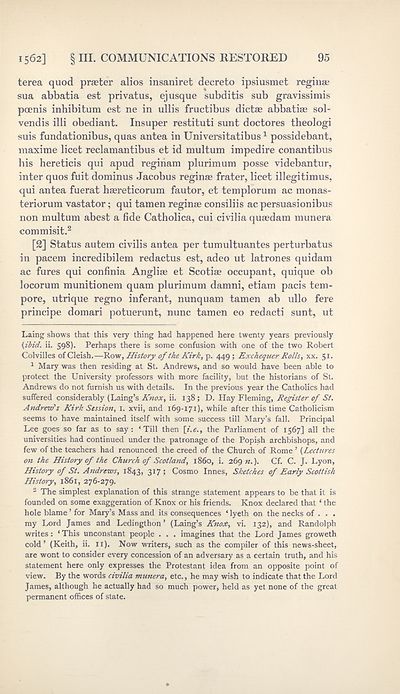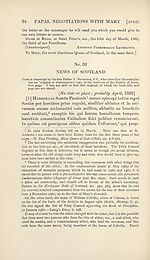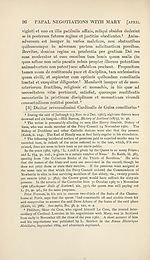Series 1 > Papal negotiations with Mary Queen of Scots during her reign in Scotland, 1561-1567
(244) Page 95
Download files
Complete book:
Individual page:
Thumbnail gallery: Grid view | List view

95
1562] § III. COMMUNICATIONS RESTORED
terea quod praeter alios insaniret decreto ipsiusmet regina:
sua abbatia est privatus, ejusque subditis sub gravissimis
poenis inhibitum est ne in ullis fructibus dictae abbatiae sol-
vendis illi obediant. Insuper restituti sunt doctores theologi
suis fundationibus, quas antea in Universitatibus1 possidebant,
maxime licet reclamantibus et id multum impedire conantibus
his hereticis qui apud reginam plurimum posse videbantur,
inter quos fuit dominus Jacobus reginae frater, licet illegitimus,
qui antea fuerat haereticorum fautor, et templorum ac monas-
teriorum vastator; qui tamen reginae consiliis ac persuasionibus
non multum abest a fide Catholica, cui civilia quaedam munera
commisit.2
[2] Status autem civilis antea per tumultuantes perturbatus
in pacem incredibilem redactus est, adeo ut latrones quidam
ac fures qui confinia Angliae et Scotiae occupant, quique ob
locorum munitionem quam plurimum damni, etiam pacis tem¬
pore, utrique regno inferant, nunquam tamen ab ullo fere
principe domari potuerunt, nunc tamen eo redacti sunt, ut
Laing shows that this very thing had happened here twenty years previously
{ibid. ii. 598). Perhaps there is some confusion with one of the two Robert
Colvilles of Cleish.—Row, History of the Kirk, p. 449; Exchequer Rolls, xx. 51.
1 Mary was then residing at St. Andrews, and so would have been able to
protect the University professors with more facility, but the historians of St.
Andrews do not furnish us with details. In the previous year the Catholics had
suffered considerably (Laing’s Knox, ii. 138; D. Hay Fleming, Register of St.
Andrew's Kirk Session, I. xvii, and 169-171), while after this time Catholicism
seems to have maintained itself with some success till Mary’s fall. Principal
Lee goes so far as to say: ‘Till then [i.e., the Parliament of 1567] all the
universities had continued under the patronage of the Popish archbishops, and
few of the teachers had renounced the creed of the Church of Rome ’ (Lectures
on the History of the Church of Scotlatid, i860, i. 269 n.). Cf. C. J. Lyon,
History of St. Andrews, 1843, 317; Cosmo Innes, Sketches of Early Scottish
History, 1861, 276-279.
2 The simplest explanation of this strange statement appears to be that it is
founded on some exaggeration of Knox or his friends. Knox declared that ‘ the
hole blame ’ for Mary’s Mass and its consequences ‘ lyeth on the necks of . . .
my Lord James and Ledingthon ’ (Laing’s Knox, vi. 132), and Randolph
writes: ‘This unconstant people . . . imagines that the Lord James groweth
cold’ (Keith, ii. 11). Now writers, such as the compiler of this news-sheet,
are wont to consider every concession of an adversary as a certain truth, and his
statement here only expresses the Protestant idea from an opposite point of
view. By the words civilia munera, etc., he may wish to indicate that the Lord
James, although he actually had so much power, held as yet none of the great
permanent offices of state.
1562] § III. COMMUNICATIONS RESTORED
terea quod praeter alios insaniret decreto ipsiusmet regina:
sua abbatia est privatus, ejusque subditis sub gravissimis
poenis inhibitum est ne in ullis fructibus dictae abbatiae sol-
vendis illi obediant. Insuper restituti sunt doctores theologi
suis fundationibus, quas antea in Universitatibus1 possidebant,
maxime licet reclamantibus et id multum impedire conantibus
his hereticis qui apud reginam plurimum posse videbantur,
inter quos fuit dominus Jacobus reginae frater, licet illegitimus,
qui antea fuerat haereticorum fautor, et templorum ac monas-
teriorum vastator; qui tamen reginae consiliis ac persuasionibus
non multum abest a fide Catholica, cui civilia quaedam munera
commisit.2
[2] Status autem civilis antea per tumultuantes perturbatus
in pacem incredibilem redactus est, adeo ut latrones quidam
ac fures qui confinia Angliae et Scotiae occupant, quique ob
locorum munitionem quam plurimum damni, etiam pacis tem¬
pore, utrique regno inferant, nunquam tamen ab ullo fere
principe domari potuerunt, nunc tamen eo redacti sunt, ut
Laing shows that this very thing had happened here twenty years previously
{ibid. ii. 598). Perhaps there is some confusion with one of the two Robert
Colvilles of Cleish.—Row, History of the Kirk, p. 449; Exchequer Rolls, xx. 51.
1 Mary was then residing at St. Andrews, and so would have been able to
protect the University professors with more facility, but the historians of St.
Andrews do not furnish us with details. In the previous year the Catholics had
suffered considerably (Laing’s Knox, ii. 138; D. Hay Fleming, Register of St.
Andrew's Kirk Session, I. xvii, and 169-171), while after this time Catholicism
seems to have maintained itself with some success till Mary’s fall. Principal
Lee goes so far as to say: ‘Till then [i.e., the Parliament of 1567] all the
universities had continued under the patronage of the Popish archbishops, and
few of the teachers had renounced the creed of the Church of Rome ’ (Lectures
on the History of the Church of Scotlatid, i860, i. 269 n.). Cf. C. J. Lyon,
History of St. Andrews, 1843, 317; Cosmo Innes, Sketches of Early Scottish
History, 1861, 276-279.
2 The simplest explanation of this strange statement appears to be that it is
founded on some exaggeration of Knox or his friends. Knox declared that ‘ the
hole blame ’ for Mary’s Mass and its consequences ‘ lyeth on the necks of . . .
my Lord James and Ledingthon ’ (Laing’s Knox, vi. 132), and Randolph
writes: ‘This unconstant people . . . imagines that the Lord James groweth
cold’ (Keith, ii. 11). Now writers, such as the compiler of this news-sheet,
are wont to consider every concession of an adversary as a certain truth, and his
statement here only expresses the Protestant idea from an opposite point of
view. By the words civilia munera, etc., he may wish to indicate that the Lord
James, although he actually had so much power, held as yet none of the great
permanent offices of state.
Set display mode to:
![]() Universal Viewer |
Universal Viewer | ![]() Mirador |
Large image | Transcription
Mirador |
Large image | Transcription
Images and transcriptions on this page, including medium image downloads, may be used under the Creative Commons Attribution 4.0 International Licence unless otherwise stated. ![]()
| Scottish History Society volumes > Series 1 > Papal negotiations with Mary Queen of Scots during her reign in Scotland, 1561-1567 > (244) Page 95 |
|---|
| Permanent URL | https://digital.nls.uk/126974061 |
|---|
| Attribution and copyright: |
|
|---|
| Description | Over 180 volumes, published by the Scottish History Society, containing original sources on Scotland's history and people. With a wide range of subjects, the books collectively cover all periods from the 12th to 20th centuries, and reflect changing trends in Scottish history. Sources are accompanied by scholarly interpretation, references and bibliographies. Volumes are usually published annually, and more digitised volumes will be added as they become available. |
|---|


